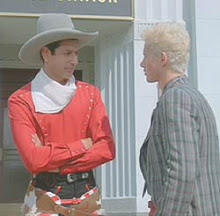
154. BOBBY WOMACK & PEACE, "Across 110th Street"
Written by J. J. Johnson & Bobby Womack
United Artists 196 1973 Billboard # 56
The release of Watchmen is reminding me about the pros and cons of soundtrack sampling--not just featuring music on a soundtrack, but using music on a soundtrack that's already been recorded for a different purpose.
Seriously, I don't mean to scapegoat Watchmen. (Not yet. I haven't seen it yet. I've only heard similarly comic-versed friends see it and shriek in horror.) But I have listened to the soundtrack album, which struck me as fairly unimaginative. Each song, as in "Forrest Gump," simply cues the audience via nostalgic association for a specific reaction to a scene.
If you're going to reuse music that's been recorded elsewhere and do it right, it needs to provide counterpoint, not double the melody. The most famous US pop example of this may be Martin Scorsese's use of "Layla" over the montage of mafia hits in Goodfellas. "But it's an elegy," the director disingenuously insisted. Still, you have to admit that playing an elegy for lost love over a sequence of dead bodies of criminals provides an interesting disjunction.
Which brings us, finally, to "Across 110th Street." To begin with, it's as beautiful a title song as blaxploitation cinema produced in the 1970s, so much so that I'm surprised that Marsh missed it in his original accounting of the period. But what brings me to address it here is Quentin Tarantino's reuse of the song in Jackie Brown (1997).

Yes, the film is an homage to blaxploitation cinema, right down to the casting of Pam Grier, the queen of blaxploitation, as the title character. The truth is, though, that Tarantino has never gotten credit for this, this best film, even down to the genius of this specific repurposing of a song.
Yes, this song was played over the credits of another film, almost a quarter of a century before--but the passage of time is very much the point here. The "day-to-day fight" Womack sings of has been going on for Grier's character for almost 25 years, and it shows. That magnifies the song, makes it bigger, extends its implications. Reusing the song in this specific case doesn't just tie the film to earlier blaxpolitation films. It legitimately asks what would have happened to the characters who had the wits to survive those earlier works. Okay, they survived that environment. Would they have thrived? By taking it down to the middle ages of the characters, the song isn't just reified--it's complicated.

No comments:
Post a Comment